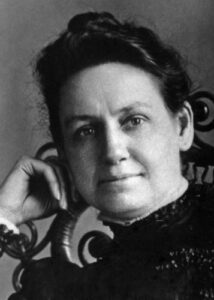
Corinne Knight True was born in Kentucky during the Civil War, the oldest child of Martha Thomas (Duerson) Knight and Moses Greene Knight. Moses Knight became wealthy by wise real estate investments in Chicago’s downtown area, but to protect his interests, Knight had to sell all of his land in Kentucky and relocate his family to Chicago after the Great Chicago Fire of 1871 and the subsequent 1873 Depression. Knight’s daughter attended Miss Mary Baldwin’s finishing school in Virginia thanks to his financial prosperity. A few months after graduating, on November 24, 1882, Corinne Knight wed Moses Adams True, the neighbor’s son.
Eight children were born to the Trues in quick succession. They employed a cook and sent the kids to a private school; the family was close-knit and rich. Corinne True was put through a lot of hardships after losing four of the kids before they reached adulthood. Instead of pushing Corrine away from belief in God, this made her more interested in religion. After Harriet True, then nine years old, died after falling down the stone basement steps, Corinne and Moses True departed from traditional Protestantism and embraced the Unity School of Christianity, Christian Science, and Divine Science. When the family’s infant, Nathanael, passed away in 1899 due to difficulties from diphtheria, Corinne grew more serious about her search for religion. Late in 1899, through a friend, she was introduced to and quickly embraced the Bahá’ Faith.
The Originator, of the Bahá’í Faith, Bahá’u’lláh, founded his religion based on such principles as the oneness of God, the spiritual unity of the world’s religions, the oneness of humanity, independent individual search for truth, and the equality of the sexes. A practical religion, it quickly spread beyond Iran and attracted Jews, Christians, Zoroastrians, and Buddhists as well as Muslims. When Bahá’u’lláh died his son `Abdu’l-Bahá became head of the Faith.
True, immediately became one of Chicago’s most active Bahá’ís. When, in May 1901, the Chicago Bahá’ís elected an all-male governing body to run the community and a women’s Auxiliary Board to assist, True wrote `Abdu’l-Bahá about the exclusion of women from the Chicago Bahá’í governing body, noting that “many” felt it should be a “mixed board” because “women in America stand so conspicuously for all that is highest asnd best in every department.” In his response `Abdu’l-Bahá stated that “in the sight of God, the conduct of women is the same as that of men” and there was “no difference” between the sexes.
In 1903 the Chicago Bahá’ís heard about the construction of the world’s first Bahá’í House of Worship, in what is today Turkmenistan. They wrote `Abdu’l-Bahá asking for permission to build a temple of their own. `Abdu’l-Bahá not only sent them two encouraging letters in response, but wrote True and encouraged her to get involved in the effort. She was surprised, as previously she had not been interested.

Corrine went to Akka, Palestine to meet `Abdu’l-Bahá, spending six days with him in late February 1907. He gave True detailed instructions about building a Bahá’í House of Worship in America. When three prominent Chicago men arrived a few weeks later, `Abdu’l-Bahá told them to work with True and that all his instructions for the Chicago Bahá’ís had been given to her.
Returning to Chicago in the spring of 1907, True began searching the area for potential building sites, especially those on the lake shore. In mid March 1908 True found a site at the corner of Linden Avenue and Sheridan Road in Wilmette, Illinois.
True believed the choice of a site necessitated the establishment of a formal, national organization, for the building would be a national House of Worship, not local. She wrote `Abdu’l-Bahá proposing that the American Bahá’ís create a national organization. In late August 1908 he replied that he was “very much pleased” with her plan, which called for the national coordinating body to be chosen by delegates selected by the various local Bahá’í communities across the United States and Canada. He added that women should be included.
In the ensuing years, True simultaneously functioned as the temple project’s finance secretary as a member of the Chicago and national Bahá’í coordinating organizations. She made trips to California and Hawaii to give talks about the Bahá’ Faith. True traveled to Akka, Palestine, on a second pilgrimage in 1919, meeting ‘Abdu’l-Bahá there in November of that year. She went to the 1920 Bahai Temple Unity meeting, where the House of Worship’s design was formally approved.
On November 29, 1921, `Abdu’l-Bahá died peacefully at age seventy-seven. `Abdu’l-Bahá’s had appointed his grandson Shoghi Effendi as his successor and Guardian of the Bahá’í Faith. True had already met Shoghi Effendi on her 1919 pilgrimage and had corresponded with him; thus she was in an excellent position to rally the Bahá’ís behind him. In early 1922 Shoghi Effendi invited a group of about fifteen prominent Bahá’ís from around the world to come to Haifa and consult with him about the future development of the Faith. Four members of the Bahai Temple Unity Executive board were invited, including True.
True went on several more pilgrimages to meet with Shoghi Effendi during the 1920s and 1930s. Her last meeting with him was in Haifa in 1952, when she was ninety-one years old. She also made lecture tours of western Europe in 1947 and 1950 in order to assist the new Bahá’í communities there.
On May 2, 1953, True attended the dedication of the Bahá’í House of Worship in Wilmette. She was thus able to see the completion of the building to which she had devoted so much of her life.
Corinne True died peacefully in her Wilmette home on 3 April 1961, five months into her hundredth year. She is remembered by the American Bahá’ís for her courage, faith, devotion, and persistence, and historically is one of the most prominent American Bahá’í women.
Edited from a article written by: Robert Stockman.




